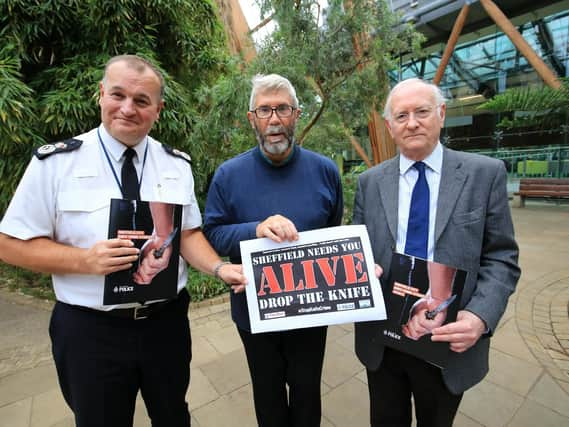Teacher's praise for the drive to reduce knife crime across the  city


A teacher who has occasionally had to deal with kids carrying knives in bags during my career, it was a breath of fresh air to see Sheffield Newspapers launch a campaign to bring knife crime to an end, saying simply that enough is enough.
There have been too many deaths and injuries over recent months and years at the hand of people carrying knifes in our city '“ and far too many that have involved people under the age of 18. Talk in the staff room can turn negative all too easily among the teaching fraternity, but there has been a real buzz of appreciation as Sheffield's reporters once again throw their support behind efforts being made to help our young people. I say '˜once again' because the attempts to get the government to give Sheffield schools proper funding are still on going and are thankfully attracting a good deal of attention.
Advertisement
Hide AdAdvertisement
Hide AdLast week, newspapers were delivered into Sheffield's schools, urging young people in the city to drop the knife and appreciate that carrying the deadly weapons can only lead to a destructive cycle. It's a very steep hill we all have to climb, and one we must begin to push on up together. But although it's a journey that can certainly involve schools there are many other organisations that need to do more work '“ and work in a more joined-up manner '“ to make a real impact on our streets.
One of the other stakeholders involved in the drive to reduce knife crime is, of course, the police '“ they are doing such a good job to use their limited resources to try and make a difference. And they are working with schools every day '“ not just dealing with crimes and teenagers taking knives into school but also by delivering effective preventative measures. Last academic year, I took my form group to join the rest of their year in the school hall to watch an innovative presentation from South Yorkshire Police officers. Guns and Knives Cost Lives had been used by the police force before and was relaunched in 2017 to help deal with the increasing problem of knife crime among young people. In the first year since the rebooted and hard-hitting presentation started to travel around schools, 143 sessions were delivered to a student audience of over 20,000. The talk was pitched at exactly the right level; there was intentionally nothing fun or enjoyable about sitting through the Guns and Knives Cost Lives talk, there was no real attempt to make this an overly entertaining session. And neither should there have been.
Police running the event intended to pull the horrific curtain on the shocking reality of crime using guns and knives '“ this was a session of shocking the students to sense. Fearsome anecdotes were followed by tear-jerking anecdotes as we learnt about the true consequences of knife crime through a series of real-life tales that only the police would have to hand. Backing up the gritty realism were a series of photographs displayed on a projector at the front of the hall. Disturbing images that neither the teachers or the students will be able to remove from their mind. I've sat through many talks given by school visitors, dealing with homelessness, domestic violence, fire prevention, not making hoax 999 calls and the experience of refugees to name but a few. None of them had the huge impact that this talk did, and I'm very pleased to see the police continuing to take this around the city's students.
Knife crime rips families apart. It's devastating for the victim's nearest and dearest, and also tears a hole in the perpetrator's family. Schools need to do all they can to reduce the threat from knife crime, a drive that involves a wide range of staff and not just teachers. The extent to which schools can be successful in reducing knife crime is limited, but we can deliver information. Information about how people are more likely to be killed if they carry a knife themselves, arming students with the information that might set them on a less destructive path.